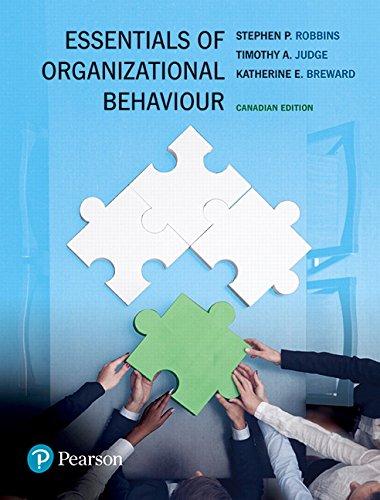Brittany sat in her office with her stomach churning. How had she misjudged a situation so badly?
Question:
Brittany sat in her office with her stomach churning. How had she misjudged a situation so badly? She knew she had just made an enemy, but it had been an accident. Now she wanted nothing more than to explain, fix it, and smooth things over. But Oscar wouldn’t even look at her, never mind talk to her. So now what?
Brittany worked for a unionized food processing facility. In addition to her HR responsibilities, she was the chairperson of an important executive committee that met regularly to discuss employee performance, rewards, and compensation. The committee did not do individual performance appraisals, but they were responsible for establishing,
monitoring, evaluating, and modifying both the performance appraisal process and the process for distributing associated rewards such as bonuses. They used hiring, performance, employee satisfaction, and turnover data from the previous year to find weak spots and assess the effectiveness of their compensation strategies. As a result of this process, the appraisal rules were revisited every year and minor changes were made.
Last year, the company had introduced a new waste reduction program.
During the town hall meeting to explain the program, one employee, Oscar, had raised his hand and asked the CEO if helping with waste reduction would be part of the bonus system the following year. It was a good question. Since bonuses were often tied to achieving very specific objectives, it was important to know what was being measured in any given year— especially since everyone had too much to do and needed to prioritize effectively to maximize performance. The CEO had confidently assured everyone that waste reduction would be considered when bonus time came around.
Eleven weeks later the committee met to review bonus criteria. Of the six members on the committee, not one had been present for the CEO’s announcement, so the committee developed bonus criteria that did not include waste reduction activities. The CEO signed off on them without noting the discrepancy and they became official.
Oscar contacted Brittany to complain. “The CEO promised that waste reduction would count for bonuses,” he said, “and now that isn’t what has happened.” He explained that he had already begun working hard on waste reduction targets. “Had I known,” he said, “I would have focused my efforts on something else. As a result, this has really impacted my performance and that isn’t fair. I’m not a troublemaker and I don’t want people to think I am, but I plan to file a grievance with the union. This isn’t the first time I’ve been given the wrong information about bonuses, and I’ve had enough! I just wanted to give you a personal heads-up out of respect for your role as Committee chair. I didn’t want to blindside you with this.”
Brittany was understandably concerned about the potential for a union grievance. She called in the other committee members for a quick meeting. “We’re in trouble,” she told the committee. “Oscar is planning to file a grievance against us!” She shared the details of his work performance and the associated complaint. They agreed to think on it overnight and discuss it again in the morning.
Someone on the committee must have met up with Oscar in the hallway afterwards, because the next thing she knew Oscar was in her office literally shaking with anger. “How could you do that?” he demanded. “I warned you ahead of time that I would file a grievance out of courtesy, since you are Committee chair, but I didn’t expect you to advertise it to everyone. It was supposed to be confidential! I report to two different people on that committee. How will I ever be evaluated fairly now that they see me as a troublemaker? I am never telling you anything again.” With that he stormed out.
Brittany was stunned and chagrined. She had misunderstood Oscar’s intent. She had honestly thought he wanted her to alert committee members that a grievance was coming. She tried to contact him and apologize, but he wanted nothing to do with her. The miscommunication had made her seem to be deliberately undermining him.
She knew how to resolve the dispute about the bonus itself—formal processes were in place to address that issue. But how could she fix things with Oscar and return to a trusting and satisfactory working relationship? Especially when he seemed convinced that she had intentionally betrayed him?
Discussion Questions
1. Identify the types of conflict being described in this scenario. What aspect of the conflict is most likely to turn highly toxic and why?
2. Discuss the linkages between poor communication and conflict that you observe in this scenario. In addition to poor communication, what else makes conflict more likely in this setting?
3. What (if anything) should Brittany do now to mend her relationship with Oscar?
Step by Step Answer:

Essentials Of Organizational Behaviour
ISBN: 9780134182971
1st Canadian Edition
Authors: Stephen P. Robbins, Timothy A. Judge, Katherine Breward





